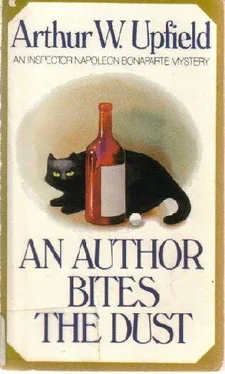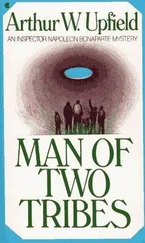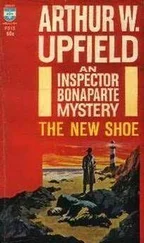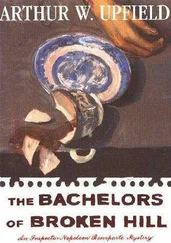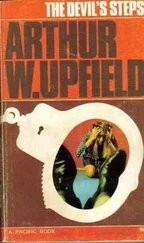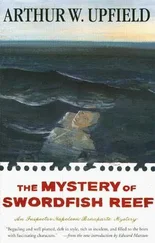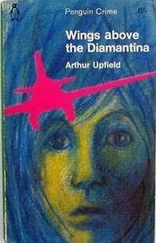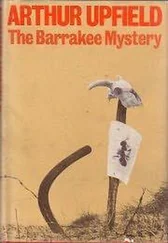Arthur Upfield - An Author Bites the Dust
Здесь есть возможность читать онлайн «Arthur Upfield - An Author Bites the Dust» весь текст электронной книги совершенно бесплатно (целиком полную версию без сокращений). В некоторых случаях можно слушать аудио, скачать через торрент в формате fb2 и присутствует краткое содержание. Жанр: Классический детектив, на английском языке. Описание произведения, (предисловие) а так же отзывы посетителей доступны на портале библиотеки ЛибКат.
- Название:An Author Bites the Dust
- Автор:
- Жанр:
- Год:неизвестен
- ISBN:нет данных
- Рейтинг книги:5 / 5. Голосов: 1
-
Избранное:Добавить в избранное
- Отзывы:
-
Ваша оценка:
- 100
- 1
- 2
- 3
- 4
- 5
An Author Bites the Dust: краткое содержание, описание и аннотация
Предлагаем к чтению аннотацию, описание, краткое содержание или предисловие (зависит от того, что написал сам автор книги «An Author Bites the Dust»). Если вы не нашли необходимую информацию о книге — напишите в комментариях, мы постараемся отыскать её.
An Author Bites the Dust — читать онлайн бесплатно полную книгу (весь текст) целиком
Ниже представлен текст книги, разбитый по страницам. Система сохранения места последней прочитанной страницы, позволяет с удобством читать онлайн бесплатно книгу «An Author Bites the Dust», без необходимости каждый раз заново искать на чём Вы остановились. Поставьте закладку, и сможете в любой момент перейти на страницу, на которой закончили чтение.
Интервал:
Закладка:
About the beautifully moulded brows a frown was strangled at birth. Nancy Chesterfield inserted a cigarette in a long jade holder, and instantly Bony was on his feet holding a match in service. Whilst she drew at the cigarette she regarded him with a whimsical smile, and he knew he had baffled her regarding the degree of his sophistication.
“Tell me what Australian authors you’ve read, and then we may discover a starting point,” she said, softly but distinctly.
Wisely he confined himself to the three novels he had read in Miss Pinkney’s garden, devoting a full minute to each. He rhapsodized over Wilcannia-Smythe’sThe Vine of Abundance. He praised Mervyn Blake’sD’Arcy Maddersleigh, and then went on, “One doesn’t come across their work in South Africa, nor in England, where I was two years ago. On the other hand, the books of I. R. Watts are widely read outside Australia. I like his novels. He holds his readers with fine suspense.”
Nancy Chesterfield listened attentively, sitting almost motionless and keeping her gaze on a pile of manuscripts on her desk. Bony liked her more and more. She was certainly very clever. She had watched his face and his eyes to get inside his mind, and now she listened to his voice in her search for the door. He was baffling her, and intuition, upon which he often relied with implicit faith, was informing him that the experience for Nancy Chesterfield was both rare and pleasing. When he had finished, she said, “When discussing Australian literature in your book-to-be, you should, I think, soft pedal on I. R. Watts. I agree that Watts writes excellent romances. When in need of light reading I go to him, but-er-he is not a creative artist like Mervyn Blake or Wilcannia-Smythe.”
For the moment Bony was baffled. But only for the moment. A woman in the position occupied by Nancy Chesterfield should most certainly have a higher appreciation of literature. Here once again was the invisible object he sought to uncover.
“Well, no, perhaps not,” he agreed reluctantly.“Still, I. R. Watts-well, well! By the way, I cannot find I. R. Watts in the localWho’s Who. I suppose heis an Australian writer?”
“Oh yes, he’s an Australian. He’s something of a mystery, I understand. He’s not a member of any literary society of national importance.” Nancy Chesterfield tapped the ash from her cigarette and Bony sensed that she was gathering her forces to attack. “You see, Mr Bonaparte, our national literature is fast growing up, and it is vitally important that the work of our authors should be judged with extreme care, that the grain should be winnowed from the chaff, so that the authors of the future will be influenced by the masters of the present. If you give your attention to the work of Mervyn Blake and Wilcannia-Smythe, and Ella Montrose and others of their standard, you cannot go wrong in an appraisement of Australian literature today. A critical survey you should also study is that made by Dr Dario Chaparral, of Colombia, South America. He visited Australia twelve months ago and has just published in English the result of his study of our literature. I haven’t a copy here, but you can obtain one at most booksellers, I think.”
“Dr Chaparral!” Bony echoed. Screwing his eyes into blue points, he went on, “No, I haven’t met him, but I’ve heard of him. Did you meet him?”
“Yes. When in Victoria he stayed with Mr and Mrs Blake. Do you know their house at Yarrabo?”
“Oh yes, it’s next door to the cottage where I am lodging. Blake died suddenly, did he not?”
“That is so,” Nancy Chesterfield replied. “If you stay long you will doubtless learn as much about that unfortunate event as anyone. Australian literature suffered severe loss in Blake’s demise. Still,” and she brightened with astonishing swiftness, “there are others to carry on the leadership and continue directing our young authors in the way they should go. I do hope your book is successful, Mr Bonaparte, and I’m really delighted that you came to see me. I like talking to importantoversea people, especially literary people, and I am going to give you an introduction to Mr Wilcannia-Smythe, who is staying at the Rialto. In fact, he is the man I was having afternoon tea with. You’ll like him, I’m sure. He’s a Sydney man, and is here gathering material for a new book.”
“You are most kind, Miss Chesterfield. I shall be delighted to meet Mr Wilcannia-Smythe. You place me in your debt.”
“Not at all, Mr Bonaparte. You must also meet Mrs Blake and Mrs Montrose before you leave us. It’s a pity we didn’t know you were coming to Australia. We like to entertain men like you and Dr Chaparral and Marshall Ellis of London.”
Bony bowed from his chair.
“It’s most charming of you,” he said. “I feel sure I shall like them.”
“Well, I do want you to return to South Africa with a balanced opinion of us,” she went on. “So many visitors to Australia leave with a distorted view of us simply because they haven’t been able to meet the right people.” She smiled at him and added, “My job here is to publicize anyone with news value, as of course you know. After you’ve gone I shall write a happy little paragraph about you. You’ll find it in tomorrow morning’s paper. I hope you will come and see me again.”
“I am daring to hope that you would lunch with me,” Bony said, having risen.
“I’d love to-but remember what Clarence B. said about me.
“I shall never forget it, Miss Chesterfield. Could we arrange a day?”
A well-manicured hand was put forward to turn the leaves of an engagement book.
“Would Friday suit you?”
“Of course.”
“Then you may call for me here at one. Don’t bother with a taxi. I have my own car. I’ll post the letter of introduction for friend Wilcannia-Smythe to the Yarrabo Post Office. You’ll get it tomorrow.”
He thanked her, and she shook hands in a manner he liked. She was entirely outside all his previous experience, but he felt he was parting from her on equal grounds. Impressionable as when an undergraduate, he walked out of the building feeling pleasurably excited, believing that he had detected a facade behind which dwelt the real Nancy Chesterfield.
Chapter Fourteen
Wilcannia-Smythe’s Adventure
BONY arrived back at Yarrabo shortly after half past three, and near Miss Pinkney’s gate a little girl stopped him, saying nervously, “Please, sir, my father wants to see you at the police station.”
Having given the message, the child instantly left him to cross the road and enter the store. Hot, thirsty, and fatigued by the journey from the city, Bony hesitated whether to obey the summons or first find out if Miss Pinkney’s kettle was boiling. He decided to go to the police station.
There was no one in the office with Constable Simes, who at once crossed to the door and closed and locked it.
“So’swe won’t be interrupted,” he said. “I’m glad you returned by that train or I’d have had to play off my own bat and that mightn’t have suited you.”
“I hope it’s important,” Bony said, seatinghimself. “I was looking forward to Miss Pinkney’s afternoon tea.”
“My sister’s taking care of that,” Simes hastened to say. “I saw you turn into the main road from the station, and I sent my girl after you in preference to bailing you up. Something has happened that may bear importantly on the Blake case.”
“So! Go on.”
“At eight five this morning an old car stopped here and two men came in. I had just begun my office work. One of these men was Wilcannia-Smythe and the other was a forestry man named Jenks. At this time Jenks is camped about three miles from the junction of the Old Warburton Road with the main highway. At half past seven this morning he left his camp in his old car and came this way down the Old Warburton Road to his work. He was about half a mile from his camp when he saw a man tied to a tree. This man, Wilcannia-Smythe, was in full view, although the tree to which he was tied is about eighty yards up the side of a foothill. Jenks left his car and walked up to the tree, released Wilcannia-Smythe, and brought him here.
Читать дальшеИнтервал:
Закладка:
Похожие книги на «An Author Bites the Dust»
Представляем Вашему вниманию похожие книги на «An Author Bites the Dust» списком для выбора. Мы отобрали схожую по названию и смыслу литературу в надежде предоставить читателям больше вариантов отыскать новые, интересные, ещё непрочитанные произведения.
Обсуждение, отзывы о книге «An Author Bites the Dust» и просто собственные мнения читателей. Оставьте ваши комментарии, напишите, что Вы думаете о произведении, его смысле или главных героях. Укажите что конкретно понравилось, а что нет, и почему Вы так считаете.
